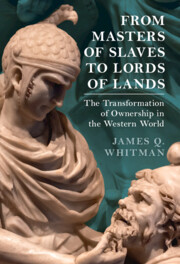Book contents
- From Masters of Slaves to Lords of Lands
- Studies in Legal History
- From Masters of Slaves to Lords of Lands
- Copyright page
- Dedication
- Contents
- Acknowledgments
- Introduction: Owning Humans, Owning Land – Two Primitive Modes of the Property Imagination
- Part I Masters of Men and Beasts
- 1 Hierarchy and the Hunt for Prey: Early Human Ownership
- 2 Masters of Men and Beasts: The Early Roman Fantasia of Ownership
- 3 The Dominus Enters the Law
- 4 Classical Roman Slave Law: The Just Hunt for Human Prey
- 5 An Empire of the Chieftainship over People
- Part II From Masters to Lords
- Conclusion: From Man the Killer to Man the Tiller
- Bibliography
- Index
- Studies in Legal History
4 - Classical Roman Slave Law: The Just Hunt for Human Prey
from Part I - Masters of Men and Beasts
Published online by Cambridge University Press: 28 November 2024
- From Masters of Slaves to Lords of Lands
- Studies in Legal History
- From Masters of Slaves to Lords of Lands
- Copyright page
- Dedication
- Contents
- Acknowledgments
- Introduction: Owning Humans, Owning Land – Two Primitive Modes of the Property Imagination
- Part I Masters of Men and Beasts
- 1 Hierarchy and the Hunt for Prey: Early Human Ownership
- 2 Masters of Men and Beasts: The Early Roman Fantasia of Ownership
- 3 The Dominus Enters the Law
- 4 Classical Roman Slave Law: The Just Hunt for Human Prey
- 5 An Empire of the Chieftainship over People
- Part II From Masters to Lords
- Conclusion: From Man the Killer to Man the Tiller
- Bibliography
- Index
- Studies in Legal History
Summary
This chapter challenges the idea that the classical Roman jurists were “pioneers of human rights.” The jurists had no doubts about the legitimacy of the hunt for human prey in war. Quite the contrary: they thought of the capture and enslavement of enemies as a paradigm of just acquisition. It is crucial that we come to terms with this ancient belief system: We must recognize that the classical jurists did not see any need for justification for slavery beyond the fact of victory in battle or in the sack of cities. The use of theories like Aristotelean natural slavery or the teaching that slavery arose out of the consent of the victim date only to the early modern period. The chapter closes by discussing how the jurists used the model of the hunt for human and animal prey as the basis for analogical reasoning.
- Type
- Chapter
- Information
- From Masters of Slaves to Lords of LandsThe Transformation of Ownership in the Western World, pp. 160 - 207Publisher: Cambridge University PressPrint publication year: 2025

